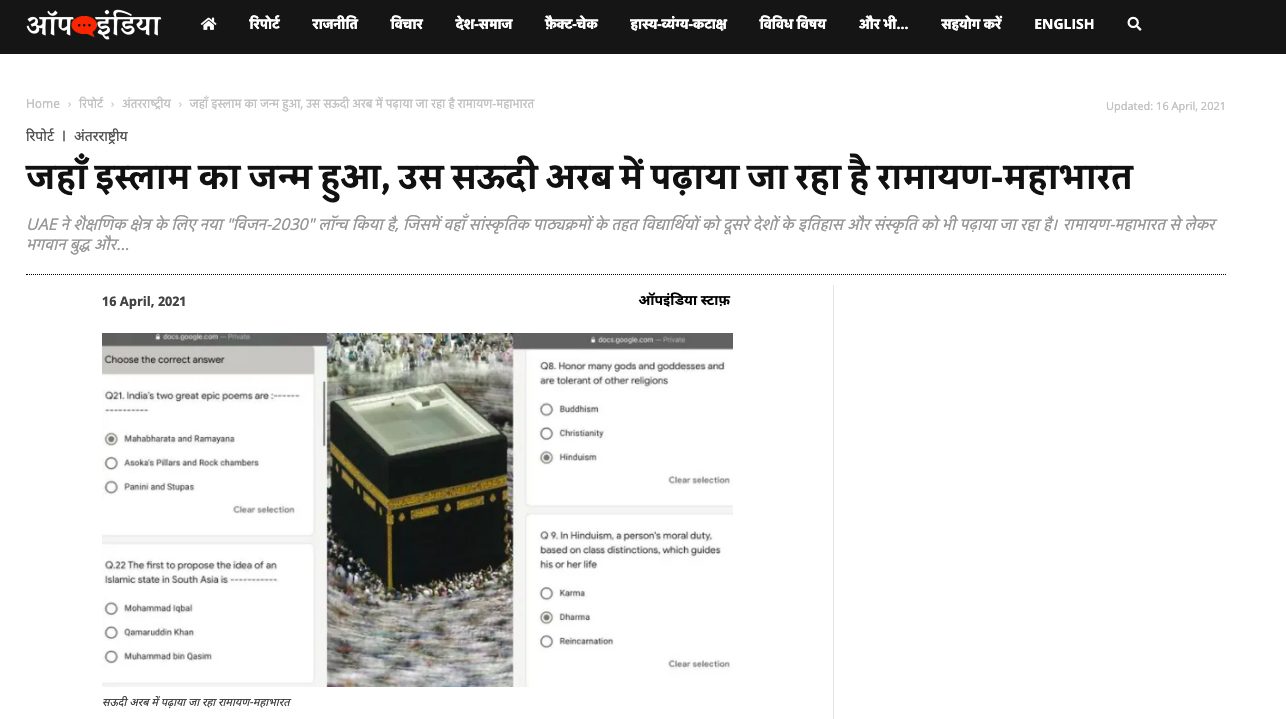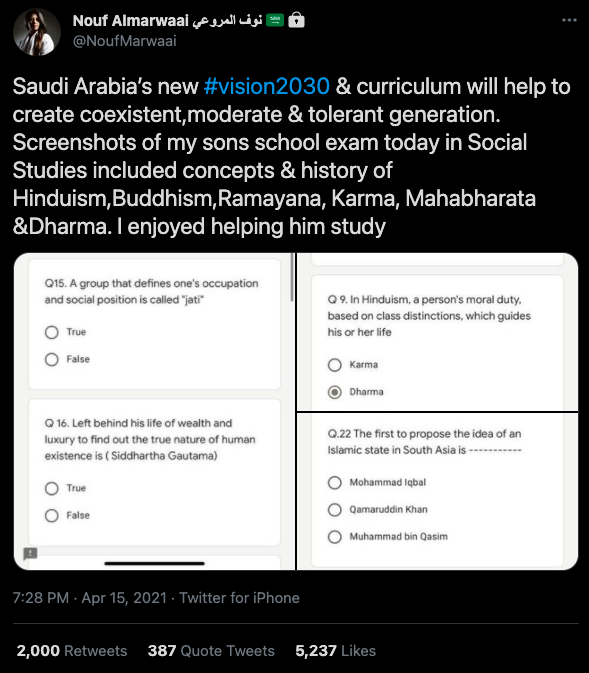A recent viral claim suggesting that Saudi Arabia had introduced the teaching of two ancient Indian epics, Ramayana and Mahabharata, in their school curriculum under the ‘Vision 2030’ initiative has been debunked by Alt News.
On October 5, 2023, journalist Abhijeet Majumder shared a video report of Zee Media’s WION channel on X (formerly Twitter). The report says that the Ramayana and the Mahabharata will be taught to students in schools in Saudi Arabia. Majumder wrote that the two epics would now be taught in Saudi Arabia but they are not taught in Indian schools because India is ‘secular’. (Archive)
Saudi will now teach Ramayan and Mahabharat in school. MBS is making the curriculum more inclusive.
— Abhijit Majumder (@abhijitmajumder) October 5, 2023
Unbelievable, right?
What is more shocking?
That Ramayan and Mahabharat are not taught in Bharat’s schools. Because India is ‘secular’.pic.twitter.com/zOy3t1PbZ4
He later wrote in a tweet that the video was from 2021 but his views about the Indian school curriculum would remain the same.
This is not the first time this claim has been made on social media platforms. In April 2021, several media organisations reported that the Ramayana and the Mahabharata would be taught in Saudi Arabia as part of their ‘Vision 2030’ initiative. East Coast Daily, Times Internet’s Speaking Tree, Muslim Mirror, Aaj Tak, Janta Se Rishta, ABP Education, The Kashmiriyat, Hindustan Times, Patrika, RSS mouthpiece Organiser, India Today, News18, Zee Media’s WION, Republic TV, TV9 Hindi and Yahoo News were among the outlets that covered the news.



On April 16, 2021 Nation World News and propaganda website OpIndia Hindi published an article stating that under Saudi Arabia’s ‘Vision-2030’ students are being taught the history and culture of other countries, including Ramayana and Mahabharata, as part of cultural courses.

The misinformation, which resurfaced on social media platforms in October 2023, originated from reports dating back to April 2021. Various Indian media outlets, including East Coast Daily, Speaking Tree, Muslim Mirror, and others, had reported that Saudi Arabia was incorporating these epics into their syllabus. These claims were primarily based on a tweet by Saudi resident Nouf Al Marwaai, the founder of the Arab Yoga Foundation and a recipient of India’s Padma Shri award, who shared images of a school exam paper mentioning Ramayana and Mahabharata.

However, a detailed fact-check conducted by Indian news website Alt News dispelled these claims, revealing that the information was misleading and lacked accuracy. The reports suggesting the inclusion of these epics in the Saudi curriculum were based on a misinterpretation of Marwaai’s tweet and an exam paper from a private Indian international school.
Alt News investigated the matter further, reaching out to a senior editor based in Saudi Arabia, who clarified that there had been no official statement from the government regarding the inclusion of Ramayana and Mahabharata in the school curriculum. The editor explained that the screenshots shared by Marwaai were from a private international school’s exam paper, not a government school. These questions related to the Indian sub-continent were included in a social studies and world geography subject to test students’ knowledge. The editor emphasized that the freedom of education provided to communities in these private international schools should not be confused with the curriculum at public schools.
Additionally, Saudi journalist Omar Al Ghamdi weighed in on the matter, pointing out that private international schools had been using similar curricula for years before the ‘Vision 2030’ initiative. He highlighted the need to distinguish between the curriculum in private international schools and public schools.
Nouf Al Marwaai, the source of the initial tweet, clarified in a telephone conversation with Alt News that her statement had been taken out of context. She explained that her son studied at a private school where these references to the epics were made under the Literature subhead of the South Asian Art section. However, these references were not part of the official syllabus but were included in a historical context.
Despite these clarifications, the misinformation continued to spread on social media platforms, amplified by several right-wing users who shared the false claims without verifying their accuracy.
Ramayan and Mahabharat will soon be taught in Saudi Arabia. Crown Prince MBS has directed schools to include the two Indian epics in their curriculum. pic.twitter.com/wgsulI9sqH
— Friends of RSS (@friendsofrss) April 30, 2021
Let the Truth be known. If you read VB and like VB, please be a VB Supporter and Help us deliver the Truth to one and all.
Bengaluru (PTI): Karnataka Minister M B Patil on Tuesday chaired meetings with industry representatives from the aerospace and defence, machine tools, auto/EV, and green energy sectors to discuss sector growth and government support measures.
The meetings were attended by leading industrialists and their representatives, with some participating virtually.
Speaking on the occasion, the minister for Large and Medium Industries said Karnataka is at the forefront of the country’s aerospace and defence sectors.
He noted that Suzuki and Toyota plan to launch aerial taxi services in Japan by 2028, with Bengaluru-based Sasmos supplying electrical equipment for the project.
Industrialists suggested introducing similar “fly-taxi” services in Karnataka through an appropriate policy, which Patil said would be examined seriously.
The minister highlighted the need to establish testing centres and Common Facility Centres for the aerospace and defence industries and assured that these facilities would be provided.
Suggestions were also made to prepare a comprehensive roadmap for sector growth.
Karnataka has urged the Central Government to approve Defence Corridor projects in the Bengaluru North–Kolar–Chikkaballapur and Dharawada–Vijayapura–Belagavi regions.
Industrialists also suggested a corridor between Bengaluru and Mysuru, Patil said.
He said Karnataka aims to become a hub for defence electronics manufacturing, with plans to establish a 200-acre Defence Electronics Park and a 100-acre Avionics and Sensor Park.
These projects will be implemented once the Special Investment Region is operational, and land availability will not be an issue.
On the machine tools sector, Patil said the industry has recorded an annual turnover of Rs 36,500 crore and is witnessing steady growth.
Large-scale exhibitions have increased demand, and the state must strengthen its capabilities to develop control systems for heavy machinery. One testing unit is already operational in Bengaluru, with another planned for Tumakuru. Expansion of vocational training institutes in industrial areas is also underway.
In the Auto and EV sector, Vision Group members highlighted the need for a network of dry ports and more EV charging stations across the state.
Patil noted that the Tata Group is manufacturing EV buses in Dharawada for nationwide supply. Plans for mini excavator production and export facilitation were also discussed, along with the establishment of a testing facility for two-wheeler EVs.
For the Green Energy sector, the group emphasised the need for a suitable policy on battery-based energy storage and the establishment of data centres.
Patil assured that the government will seriously consider all suggestions and respond positively.





_vb_21.jpeg)